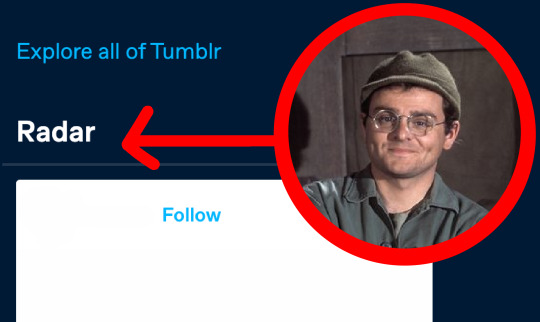Text




Each man prays in his own way!!!!!!
#you know i cant see this without thinking about the gay man thatd call up the gay bar that he couldnt go to just to know it was there#people were alive and happy and living their lives well#somewhere else. somewhere he couldnt be. but they were out there#and this is very much not the same thing but it reminds me of it#and its interesting that it plays into radars Voyeurism Thing you know#like hes always peeking at something + obscuring himself a little. im fascinated by him#radar o'reilly#caps
90 notes
·
View notes
Text


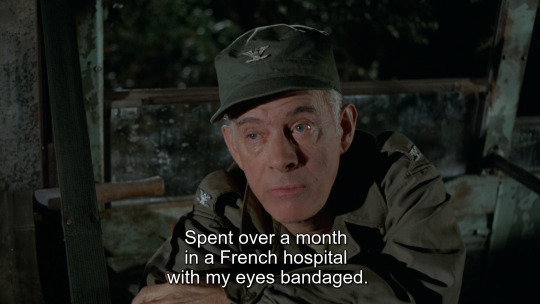

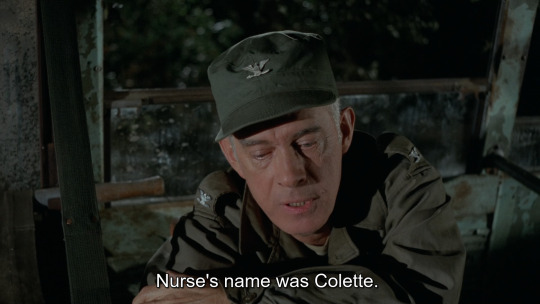
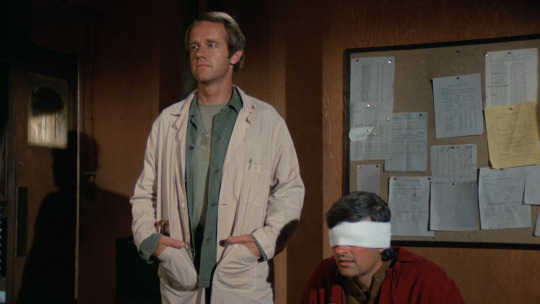






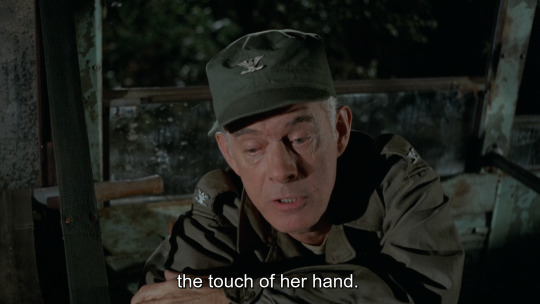


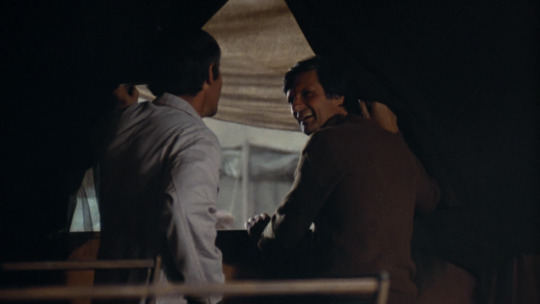
'The Bus' /// 'Out of Sight, Out of Mind'
#EZRA WHAT THE HELLLLL YEOUCH OUCH OUCH OUCH OUCHHHHHH!!!!!!!!!!!!! exploding into pieces.#(this is very good + hurting me goodly)#beejhawk#caps
458 notes
·
View notes
Text

bj and hawkeye based on this drawing by klaus voorman of lennon-mccartney
505 notes
·
View notes
Text




guys in my house
#ohhhhh my god i missed this#beejhawk#hawkeye pierce#bj hunnicutt#art#clay#They Just Make Me Happy To Look At
374 notes
·
View notes
Text
Radar and Bisexuality
I have found Radar's relationship to sexuality extremely interesting for some time now. His interest in women seems legitimate, but he also has several interesting moments that make me squint, even being in a TV show from the 70s set in the 50s.
I'm going to break this down into three parts: his interest in women, his interest in boys, and his interest in both.
Interest in Women:
Radar has a storied history of interest in women throughout the show. Examples include:
Lt Simmons in Springtime
Lt Anderson in Love Story (not to mention his ex-fiance!!)
The nurse in Army Navy Game he asks to check out the supply tent with
Not to mention all of his women's shower tent peeking!
Interest in Boys:
In Potter's Retirement, the bellhop conversation goes interestingly awry: "Wouldn’t that be something, sir? To have a real beautiful bellhop with naked feet and he-- I mean she"
In The Nurses, he has two moments: the first is when Tony shows up and Radar goes, "Boy, you'd think the Army would try to fix it so that guys that are married with each other could be in the same outfit." And then later on, when Tony is about to leave, he says to his wife, "Take care of yourself, sweetheart, okay?" And Radar, looking oddly heartbroken, replies, "okay." Have we perhaps got a crush on our hands?
And then in Goodbye, Radar, there's the, "It was four guys got me smelling like this!" and Potter just goes, "Well, as long as you had a good time."
Interest in Both:
In George, Radar sidles up to watch Hawkeye painting a nurse's toenails, and is very oddly flirty towards HAWKEYE- see the way he breathily goes, "you're doing a real nice job" and then demurs coyly with his eyes down when Hawkeye offers to do his too.
Back to Springtime, at the end he's asking relationship advice from Trapper/Hawkeye and goes, "well, I've got this friend." Trap/Hawk go, "who is she?" Radar replies, "who says it's a she?"
In Edwina, when Radar is getting looked over by Trapper for his injured eye, Trapper tells him to take a break from looking in the women's shower, and look in the men's shower instead. Radar doesn't look particularly upset about this suggestion.
Analysis:
I find it extremely interesting that Radar seems to display a lot of self-conscious or defensive behavior when his heterosexuality is questioned, especially when there are others around. See him sweating and panicking when Margaret is pinning the dress on him for the Korean wedding, and shouting at Roy/Igor when they tease him. When it's only around friends or one other person, his reaction is less severe; see him just rubbing Hawkeye's forehead kiss off in Cowboy.
He also doesn't seem to care at all about queer behavior in others- in Adam's Ribs, when Hawkeye goes "I love her" about the operator, and Radar corrects him, "it's a he," Hawkeye immediately goes "I love him" and Radar gives absolutely zero fucks about it.
As time goes on, Radar's character evolves quite a bit (and that might be the subject for another analysis later on), but one thing I notice is he seems to be more comfortable being... campy isn't quite the right word, but showing more stereotypically feminine or homosexual behavior. See him swooning over Nurse Baker and her husband in The Nurses, and mooning over Margaret and Donald in Margaret's Marriage. Our little boy is just a romantic at heart <3
I think it's very feasible that Radar grew up seeing homophobia/transphobia (per his story about Uncle Ed fighting Boris), and probably internalized a sense of "I cannot exhibit this behavior, it's not acceptable" and this might be where some of his defensive behavior might spring from, especially in earlier seasons. But then as he spends more time in this (incredibly fruity) army camp, he seems to relax a little bit in his mannerisms and even lets slip some possible same-sex interest (ie the bellhop's feet). Here's hoping he meets a nice boy when he gets back home to Iowa :radarsalute:
49 notes
·
View notes
Text
for every hello, there's two goodbyes: mashgender and marriage (part one)
i. marriage is an economic proposition…
or at least, that's what amy march said. it's tangled up in the baggage of longstanding gender roles enforced by societal pressures, expectations, and compromise for survival. a wonderfully told story of struggling against this lies in M*A*S*H. margaret and hawkeye are useful to compare and contrast with regards to this. just putting them side by side makes them stand out against each other like complementary colors because of how diametrically opposed they are.
for the purposes of cohesion, i'm going to focus on the following episodes. that means i will be approaching them individually with minimal details from the rest of the show. the starred ones are the most relevant if you want to run through them before reading!
2×14 hot lips and empty arms*
2×11 carry on, hawkeye*
3×19 aid station*
4×21 the more i see you*
5×02 margaret's engagement
6x07 in love and war
6×12 and 6×13 comrade in arms
7×02 peace on us
8×14 stars and stripes*
part one | part two | part three
ii. you've emasculated me for the last time!
first i want to establish what kind of genderbaggage these two have. again, it's useful to look at them interacting with each other because their personalities are exaggerated in juxtaposition. two examples of this can be found in 2×11 carry on, hawkeye and 3×19 aid station. there's a bunch of other comparable episodes but i think it's useful to take a look at what was established early on when hawkeye and margaret are at their most antagonistic.
carry on, hawkeye is truly a treat for those that love when hawkeye is a bisexual shithead. the unlikely allies narrative forces hawk and margaret to work together in a way that only works because both of them take their jobs very seriously (put a pin in that). but there's still so much friction here, and part of that is how their rank/roles in surgery (something margaret is concerned with) and gender (something hawkeye is concerned with) interact. hawkeye is a captain. margaret is a major, so she takes it upon herself to enforce that. and she won't take hawkeye's bullshit for too long. he starts biting at her ankles here by poking at her insecurity of being the other woman through the blowup sex doll joke at frank's expense, which has sprinklings of misogyny, and is, nawt cool. she keeps her head up though, declaring:
MARGARET: You've emasculated me for the last time. I'm in charge now. HAWKEYE: Okay, Madame President.
whatever upper hand margaret has in this dynamic though, that doesn't really matter when it comes to surgery. she's a nurse, and he is a surgeon. she will have to defer to him because margaret tries to believe in hierarchies to maintain order, and she knows that she's not been properly trained what hawkeye does pretty damn well.
the thing that complicates this dynamic is that neither one of them wants to be where they are. hawkeye is the current ranking surgeon because henry has fallen prey to Floor. he is not interested in it though, and that pisses margaret right off.
MARGARET: You've just been waiting for a chance to take over, haven't you. HAWKEYE: Look, I want a command about as much as I want a scholarship to Devil's Island. [1]
[1] French penal colony, which stopped operations midway through the Korean War in 1952.

figure 1. he is like kitty cat. he is presenting. he is silly :)
hawkeye continues to play the fool, a swishy funny femme to margaret's straight man butch. the serum injection scene is a microcosm of this. hawk lounges around lazily, happily taking his clothes off for the opportunity to fluster margaret (why are his pants tucked in for that scene LOL), making countless movie references. hawkeye jokes and jokes because that is how he operates, he only locks in when shit gets serious. margaret takes everything seriously, and looks down on his frivolity - which loops back around into hipocrisy as she invents exception after exception for, say frank's stupidity. speaking of which, the opening part of aid station features frank whiteknighting for margaret, which she finds charming for some godforsaken reason.
FRANK: Foul mouths! There is a lady present. TRAPPER: Well, where is there a lady present?
now this is juicy stuff. frank is playing the part that margaret wants in a man (more on this in section iii). trapper on the other hand, is setting up for a joke with a hawkeye delivered klinger punchline (sad!! because he's slaying!!), but at the expense of margaret. this is a common theme in early M*A*S*H where the object of amusement is margaret's masculinity, by way of undercutting her femininity. this is fun to untangle, because sometimes it is truly just unfunny misogyny, but at other times it ranges from TRANS??? to an interesting look into margaret's worldview.
MARGARET: Well, I'm a married man too, Frank... married to the army. […] I'll still be in the service. I'm an army brat, Frank. My father was a colonel and my mother was a nurse, and I was conceived on maneuvers. The army's in my blood. I need its discipline, its traditions. […] That's why I volunteered, Frank... to serve the army I love. Because I'm not just Major Margaret Houlihan, army nurse. I'm also Margaret Houlihan... frail, vulnerable, sensitive female.
LOTS TO UNPACK HERE. GIRL. we have the typical gag of margaret speaking for frank, which is also a joke based on contrasting femininity/masculinity by having [gasp] a woman talking over a man. scary! that guy frank sure needs to man up and say something. slash sarcasm. margaret's idea of masculinity is tied up with the military. her masculine ideal is someone like her dad (i won't get freudian on you i promise), someone who can embody her conservative ideals. and the next best thing turned out to be frank burns.
margaret's bulldozing confidence is also present in another scene where the jeep breaks down and she immediately leaps into action. very military! very masculine! followed by a category 5 hawkeye car misogyny moment (more on this later in section v).
MARGARET: Yeah. I'll have the tire changed in two shakes. HAWKEYE: You'll have it changed? MARGARET: Well, you're the surgeon. We can't risk your hurting your hands. HAWKEYE: [chuckles] I'm not gonna let a woman do that. MARGARET: Don't think of me as a woman.
margaret has to refuse the role of "woman" to jusitfy her doing something that is, actually very practical and also relevant to her skillset with cars. which disappears when their jeep breaks down in 6×12 comrade in arms: part 1 but i guess that was engine failure and not a tire change. too bad she wasn't there to pick up B.J.! either way, im spraying hawkeye in the face with a water spritzer. and this is of course followed up by hawkeye describing himself as "ungallant", a refusal of knightly masculinity. in fact he's so happy to stay out of charge until they get to the aid station, which is when hawkeye kicks into gear (pull that pin out now!) because people are in trouble. then, and only then, will he start acting the part that margaret wants him to - on his own terms. and it works, by the end of the episode, they have reached some kind of middle ground.
a quick sidebar: klinger being here for this episode is kind of incredible as a foil for margaret and hawkeye. he's pretty much confidently masculine in the way that he carries himself and acts, but he's also confidently feminine in his presentation and revels in his clothing and jewelry. while he does express some hangups on this later on, because of his pupa state crawling out of gag characterhood, these are irrelevant. he's chillin'.

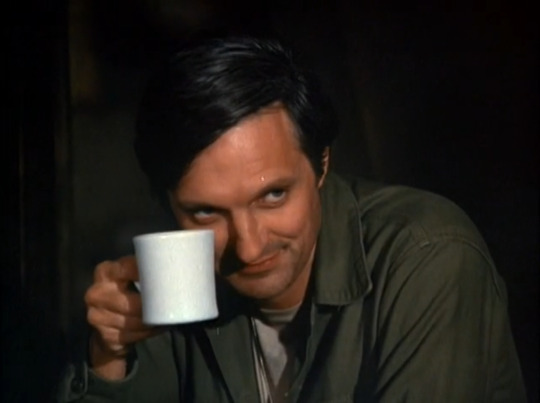
to be continued in part two!
#MASHoles meta may#MJ THIS ROCKS YIPPEEEEEE#u have such a fun and funny essay voice what a delight#thoughts#margaret houlihan#hawkeye pierce
26 notes
·
View notes
Text
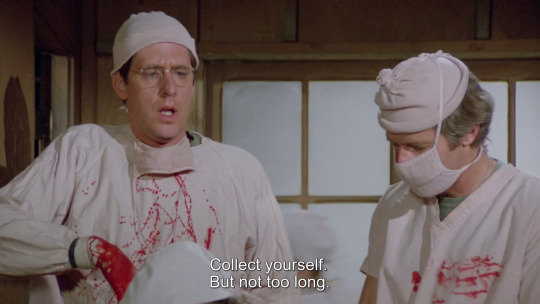

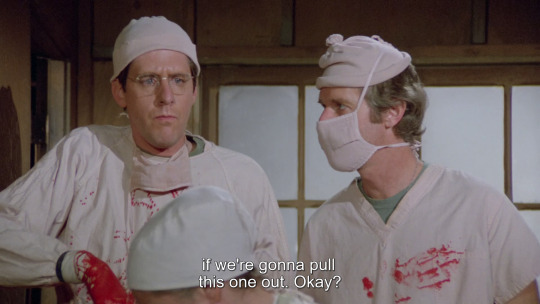
I'm not going to get into the symbolism of how much blood is on Newsome's hands and scrubs vs BJ's because I think that's been talked about a lot. But what's also really telling about this scene in particular (and a later scene which I will get to), is how it really helps charts a timeline of BJ's denial about being a pawn in a militaristic chess game, wanting to do good and serve others, and his anger towards everything in general.
Despite everything, despite having had fits of undeniable rage - at this point, there's still a part of him that is clinging to the idea that he is going to come out of the war exactly who he was when he went in. He's openly admitted how angry he is, he's allowed the anger to escape and display itself physically, but he still believes if he does "the right thing," it will all end up as intended. He still thinks if everyone works together, if everyone does their best, if everyone accepts that they are in a situation completely not in their control - that the common ground they meet on will help propel them to the other side. Whether that "other side" be of an OR session or the end of the war is irrelevant. BJ is still hoping that having a plan and having a goal is enough. He hasn't yet realized that sometimes strength and perseverance may not always be enough.

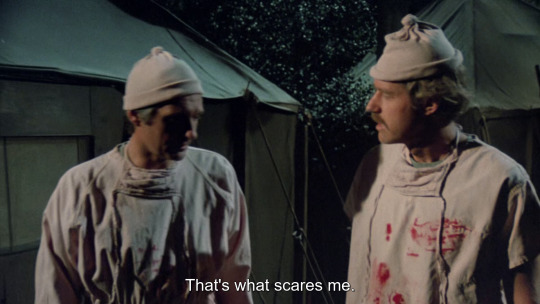
Hawkeye gets it. By the sheer fact that he has been at this longer than BJ, Hawkeye sees the bigger picture while BJ is still collecting the pieces. In "BJ Papa San," Hawkeye wasn't at all surprised by BJ's outburst. He didn't flinch. He knew BJ had to come to the conclusions and realizations himself. Words from someone else were irrelevant. This time, Hawkeye and BJ both hear the exact same words, both see the exact same scene playout in front of them - but due to varying degrees of experiences and personal timelines... Hawkeye feels the fear before BJ does. BJ still hasn't shaken the idea that hope and strength is enough to get him out of this mess. That he'll be okay. Hawkeye realizes that none of that matters. It doesn't matter how strong you think you are, or how strong everyone else thinks you are. The stain is permanent and eventually it's going to show itself to the world. Excellent foreshadowing, but that's neither here nor there.

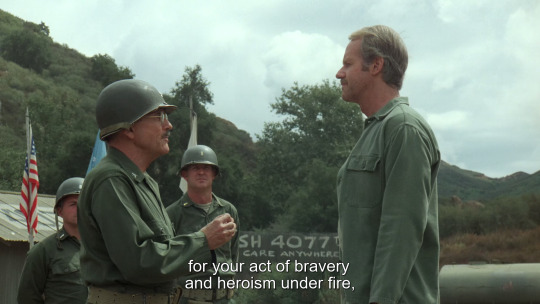
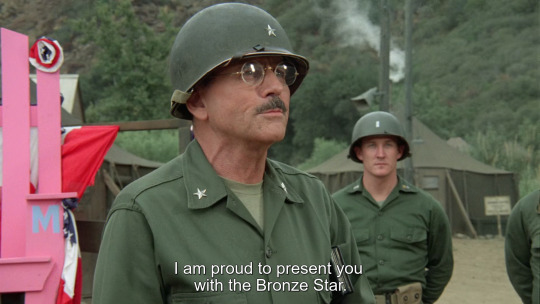
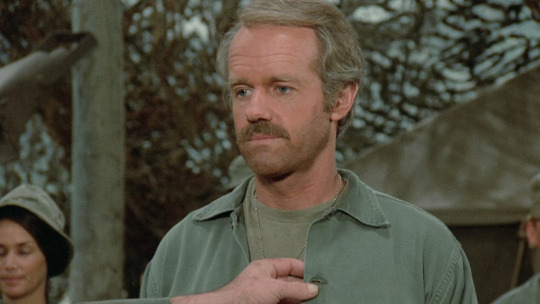
Then "Bombshells" happens. It took until nearly the end of the entire show for BJ to have his moment where he realizes "the right thing," and "hope" weren't enough. That he wasn't special. That he hadn't figured out the secret code. That ultimately, it didn't really matter what he did or didn't do. That even being "strong" and "brave," meant something totally different depending on who was watching or listening.
The military saw his acts as "brave" and "heroic." The words alone sickened BJ. What's so "brave" and "heroic" about not saving someone when that's the entire reason you were brought over? It didn't matter how "strong" he was in the eyes of anyone else. It didn't matter that he had made a tough decision and saved himself. What even is strength?


He never wanted to be a "soldier," and of course a large part of it is because he disagrees with everything about war and bloodshed, and the people that force others to take part in the acts. That's no secret. But personally, I think up until "Bombshells," BJ really thought he hadn't fallen victim to the same control that "soldiers" did. I think he really still believed that his vision of "right" and "wrong" was enough of a contrast from militaristic "right" and "wrong," to separate him. To not lump him into a category of men and boys whose sole purpose was to kill. That if he did what was expected of him, on his own terms, that somehow made him stronger than the machine forcing him and everyone else into the situations.
BJ's idea of "what was expected oh him" was always to survive - no matter what. He set that expectation on himself. He had to get home to his wife and daughter and the idealistic perfect life he was meticulously crafting, and if he could simultaneously do that while helping and saving others - than his idea of "strength" stayed in tact. Do what you're told/asked - but make it home not just alive, but unscathed. That's it. That was the goal.
151 notes
·
View notes
Text
MASHOLES META MAY: "Mulcahy's War", a Pro-War Episode.

This small essay was created to participate in the MASHoles Meta May challenge. run by the wonderful @discocaptain ! In which all participants were encouraged to create an essay which is at least 300 words in length from the 5th of May to the 5th of June.
When I started watching MASH, it was as part of a self-guided study of War Media, digging at the question of whether it is possible to produce a narrative that is truly anti-war. This has been my primary lens for MASH, and contributes significantly to my interpretation and relation to the episodes, it is also what this analysis will be about—I argue that “Mulcahy’s War,” as singular episode, is not anti-war, but pro-war.
To start, I should define further that in my analysis of whether a piece of media is anti-war or not, I stipulate that “War is bad/awful/Hell” is not enough for me to classify a piece of media as anti-war. In the broad Christian conception, of course, Hell is the worst and most torturous existence a soul can fathom—but it is often considered a “necessary evil” to punish the wicked for their misdeeds. Similarly, a lot of media about war considers the wars fought to be horrible and heart-breaking but, ultimately, useful, perhaps even worth the price that was paid in civilian lives.
I will be going through the episode Mulcahy’s War, selecting the moments that contribute to my feeling that this episode conveys a pro-war sentiment, and laying out why I feel that.
To re-summarize the episode: A wounded soldier, Fitzsimmons, shot himself in the foot to get off the front lines. Mulcahy is asked to provide Fitzsimmons with some counseling. Once there, Fitzsimmons and Mulcahy discuss a priest they both know, Boom Boom, who told them both stories of his time at war. Mulcahy says that he doesn’t find the war as exciting as Boom Boom did, and Fitzsimmons agrees. Fitzsimmons says that he shot himself in the foot to get away from the front. Mulcahy asks how old Fitzsimmons is, and when Fitzsimmons says “Eighteen and a half,” Mulcahy replies:
MULCAHY: Well, you’re young. You’re far from home. You made a mistake. But we all do foolish things. FITZSIMMONS: It wasn’t foolish. I’d do it again in a minute. MULCAHY: You can’t mean that. FITZSIMMONS: Father, you sit around with your butt in the mud for weeks, watching snipers pick off your buddies one by one. They sneak up at night in canvas shoes, so you can’t hear them. One night, I was in a foxhole with four other guys. I snuck out to go to the latrine, and when I got back, all four of them were dead. I couldn’t take it anymore. MULCAHY: Danny, I’m sure it’s rough out there. I—I imagine it’s very difficult, but— FITZSIMMONS: You imagine? Father, haven’t you ever been up there? MULCAHY: N-no. FITZSIMMONS: You’ve never been up there? Not even for a little while? MULCAHY: Well…I’ve wanted to go…but…I’m not allowed. FITZSIMMONS: Boy, if Boom Boom could see us now. He’d wonder where he went wrong. MULCAHY: Well, let’s not talk about Boom Boom. Let’s talk about you. Tell me about it. I know it’s rough. FITZSIMMONS: Father, with all due respect, we don’t have anything to talk about. Let’s face it. You have no idea what it’s like up there.
From there, Mulcahy goes to Potter, asking to be sent up to the front lines. Potter tells him no, and furthermore that Mulcahy’s got “the toughest job in camp” and that it’s a thankless job, but that he holds the camp together.
MULCAHY: Colonel, Boom Boom used to excite us with his stories about being right up front with the men, and that’s where I wanna be.
Note this—Mulcahy insists his real ambition right now is to be where war is “exciting.” A few lines earlier in this conversation, when describing the conditions for the soldiers, he says “They need comfort up there, where they’re wet and cold—and facing bullets!” Putting a particular emphatic energy on the word bullets. He seems to feel useless at the camp, and thinks he will be more useful where the fighting and conflict and death is happening—where there’s action, and is excited about that prospect.
POTTER: You’re doing a fine job, but try to understand, you’re a chaplain, not a soldier. MULCAHY: Well, I think I’m a soldier too, sir. I certainly look like one.
Radar gets orders to go to an aid station at the front, and to pick up a wounded soldier there. Mulcahy climbs aboard his Jeep despite Radar’s protests, because he wants to be up at the front. While collecting the soldier there, Mulcahy wishes that he was conscious so that he could offer the wounded soldier some comfort. The man at the aid station assures Mulcahy that being unconscious is as comfortable as anyone could be up at the front.
On the way back, the soldier starts choking on his own tongue, and Mulcahy has to perform an emergency tracheotomy, assisted by Hawkeye on the radio. He does a great job under the pressure. Radar is a little nauseous, so Mulcahy, who is riding a high of completing a terrifying procedure under nightmare conditions, confidently and coolly drives himself and Radar and their newly-breathing patient back to the camp.

Later, at the O-Club, Potter tells Mulcahy that Boom Boom would be proud. Hawkeye and Mulcahy have this exchange:
HAWKEYE: You know, Father, first time I operated, I was scared stiff. And there weren’t any bombs going off around me either. I can imagine what it was like for you. MULCAHY: No, Hawkeye, you can’t. HAWKEYE: Why not? MULCAHY: You had to be there.
From there, Mulcahy returns to Post-OP to speak with Fitzsimmons. The latter part of their conversation goes as follows:
FITZSIMMONS: You actually cut a hole in a guy’s throat. And under fire too. Were you scared? MULCAHY: Terrified. You know I-I think it gave me a little taste of what it was like for you. Danny, maybe it almost gives me the right to talk to you. What do you think? FITZSIMMONS, SMILING: Let’s talk, Father. MULCAHY: Yes. Why don’t we?
I think this episode has a lot of really interesting pieces to it. Along with some good jokes (many at Franks expense—and the visual gag with Mulcahy and the eyedrops) this is the most in-depth I think we go with a soldier who’s shot themself in the foot to remove themself from combat. Additionally, Mulcahy’s field surgery is really well done, well acted, and detailed enough medically that I bet Radar wasn’t the only one getting woozy listening to Hawkeye’s directions, but I am disappointed with the narrative it makes from these parts.
The core thrust of the episode seems at first to be Mulcahy wanting to “earn” the right to talk to Fitzsimmons. He only seems to lose that right after he tells Fitzsimmons that shooting himself to get away from the front lines as a “mistake” and reacts with disbelief when Fitzsimmons insisted he knew what he was doing and did it with intention.
Fitzsimmons likely assumes Mulcahy thinks he’s a coward, and then seems to accuse Mulcahy of being the greater coward for condemning his actions from this (relatively) safe camp, which isn’t directly on the front lines, where he doesn’t see the bullets flying.
Mulcahy decides he wants to go to the front—yes, he mentions the men there might “need him” more, but Potter argues against this, and when describing his desire to go up there, Mulcahy seems excited by the prospect of seeing the war up close.
Fitzsimmons experience of war on the front lines is wildly different from Mulcahy’s. I don’t think it’s an exaggeration, even, to say that Mulcahy’s experience of war on the front lines was almost heroic—fulfilling. He was only up there for a few hours, and the war became his temporary proving ground, where he could test himself against “Hell” and he did, and he came back having bested every challenge, having saved a boy’s life, returning confidently to the admiration of his friends, who are so proud of him.
Fitzsimmons describes sitting in the mud and watching his friends kill and die and kill and die (and die. and die). He felt that being there was so unbearable that he preferred to cause serious and likely permanent harm to his body just to escape.
The front lines of war are treated in this episode as though it’s a little club that one can go to, and once one has gone and gotten hazed, one would be a member, and then could talk with all other members of that club freely.See also: his exchange with Hawkeye, where he tells Hawkeye (who is offering sympathy based on his own experience of first surgery) that Hawkeye couldn't imagine what it was like for Mulcahy, that Hawkeye would have to have been there. War is far from pleasant—horrifying, terrifying—but it’s useful, for Mulcahy. It became a way for him to prove himself as both a priest and a soldier (which we know from that exchange with Potter, he wants to think of himself as).
Additionally, Mulcahy starts off the episode condemning Fitzsimmons' actions for shooting himself in the foot to get away from the fighting. I don’t believe that anything we’ve seen would change his mind in thinking that Fitzsimmons was wrong to do that. As a Catholic, he likely believes that one’s body is a temple of the Holy Spirit and therefore God’s body, rather than one’s own, and that to intentionally harm it is to sin against God. As a chaplain, and therefore a volunteer, he likely believes that one ought generally to do the duty they were given (see also: him wryly asking Klinger “Not one of life’s volunteers, eh, son?” in Army Navy Game (S01E20) seeming to imply that he considers Klinger's desperate attempts to get out of the military somewhat distasteful.
I find it hard to believe that Mulcahy would no longer believe these things—he didn't seem to experience any realization that contradicts them.
That the episode ends without fundamentally challenging Mulcahy’s belief that Fitzsimmons was wrong to shoot himself in the foot implies that Mulcahy did not have anything to learn about the nature of war or about Fitzsimmons as a person in order to relate to Fitzsimmons or understand him better in conversation, that wasn’t his problem at all. I think it's likely that, in the second conversation he and Fitzsimmons have, that he might attempt to (possibly more tactfully) still insist that Fitzsimmons was wrong and foolish in his decision to shoot himself in the foot.
That the episode ends with Mulcahy confident, proud of himself, appreciated by his friends, having been tested by the challenges of war and having come out proudly on the other side, implies that the “lesson” Mulcahy had to learn this episode was not related to Fitzsimmons at all, but merely he had to learn that he was strong and brave and a good soldier, (perhaps, this may be a silent implication of the text, unlike Fitzsimmons). The piece of Mulcahy that has changed was his embarrassment with himself for not having gone to the front lines.
This is, I think, the closest an episode of M*A*S*H gets to being quietly pro-war, because it is not terribly concerned with the people who are harmed by it—and doesn’t really seem to consider “the enemy” as people at all, but a faceless nameless force which exists only to harm—and instead, and most damningly, uses the war and the harm done by it only as a narrative tool to bolster Mulcahy’s own faltering confidence in himself and assuage his fear that he is “useless” (a reoccurring character beat which is, I think, handled the worst in this episode).
Disclaimers because this is being posted on tumblr and may reach beyond my circle of friends:
I am not criticizing "Mulcahy" I'm criticizing the writing of this episode and specifically Richard Cogan
I don't think this is the worst episode of the show, and I don't think that it's bad to enjoy it. Like I said, it has some really compelling elements.
I enjoy mash and part of how I enjoy things like shows is criticizing them! this is fun for me :)
If you made it all the way to this: hi i love u. Mwah. hope u have a good day + that my thoughts gave u something interesting to chew on.
#MASHoles meta may#thoughts#francis.m#image desc in alt text#hawkeye voice: C'MON. give it a sniff...doesn't it smell like if you took “War seperates the Men from the Boys”—#—and buried it in a narrative about a single man's self confidence under a baffling sideplot about a dog?—#—BUT AN EARNEST “War separates the Men from the Boys.” an EARNEST declaration of that. right???????#anyway joking aside#this was really fun thank u for running this challenge MJ!!!!!!!!!!!#i haven't written an essay since college and am not taking this too seriously so it is lil messy but i hope its still interesting
37 notes
·
View notes
Text


quick klinger doodle bc i have missed him <3
110 notes
·
View notes
Text

1K notes
·
View notes
Text
margaret treating frank like a dog dot mp4
#video#this is insaneeeeeee#show#calling frank to heel with a thigh pat. her angry little fist. kind of obsessed with her#thats the exact movement (without the angry fist) ive seen dog trainers use in training and competition kjadsgksjdg#margaret houlihan#frank burns#hawkeye pierce
212 notes
·
View notes
Text
fic where hawk comes home and gets repeatedly mistaken for daniel around town until crabapple cove gets used to the pierce kid gone more than half grey
88 notes
·
View notes
Text
good luck, margaret!
266 notes
·
View notes
Text
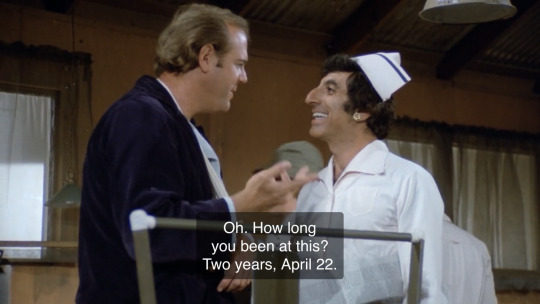
Happy Klinger started wearing dresses day to those who celebrate!
667 notes
·
View notes
